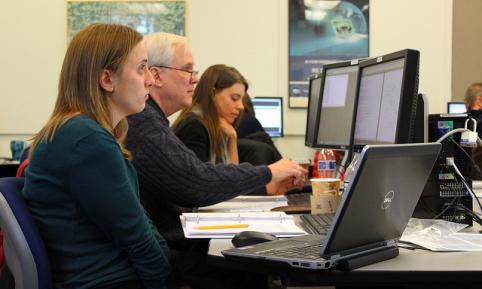Imagine a world in which academics, development professionals and data scientists come together to seek answers to long-standing questions about the distribution and impact of development activities. Now add to the mix a treasure trove of granular, georeferenced data on development projects and outcomes. What would be the result of this mash-up of big questions, granular data and great minds? You would expect to see major scientific breakthroughs that inform development policy and practice, right?
Today, we test out this hypothesis, as scholars arrive at the College of William & Mary for the inaugural convening of the AidData Research Consortium (ARC) to design research projects that will yield new insights about the targeting efficiency and effectiveness of aid.
Sponsored by USAID’s Higher Education Solutions Network, the ARC is a collaborative research network comprised of 80 scholars from universities and research institutions around the world. Leveraging subnational information about development finance activities – down to the province, district and street-corner level – the ARC will produce research to address pressing development questions in seven areas: conflict mitigation, democracy and governance, economic growth, environment and climate change, global health, food security, and humanitarian assistance and disaster response.
Bringing together professionals from diverse perspectives, backgrounds, and experience, the ARC is positioning itself to tackle complex questions about development that cut across traditional disciplinary boundaries. These researchers are also innovators in a nascent field of using subnational data and new tools, such as spatial econometrics, to tackle long-standing development questions in a different way.
“The kind of research that most social scientists were doing before they had access to subnational data was really interesting from a macro point of view, but [for] a policymaker in Namibia who is trying to figure out where to site a project, most of the work in political economy and development economics wasn’t very useful,” Director for the Institute of the Theory and Practice of International Relations at the College of William & Mary Mike Tierney said. “With the data and new tools that we have, we can do a much better job of assessing aid effectiveness at a subnational level.”

ARC members participate in spatial econometrics training during the ARC Convening. The Convening consists of two training days in Intro to ArcGIS software, spatial econometrics, and field experiments, and two days of presentaitons and collaborative meetings between research teams.
Stay tuned for updates in the coming months to learn more about the research agendas of the seven ARC teams and the projects they will initiate in the coming year. We have high hopes the ARC will, in the words of AidData Co-Executive Director Brad Parks, “open the flood gates for an entirely new generation of development research at the subnational level with more relevant insights for people that are in policymaking and programming positions.”
